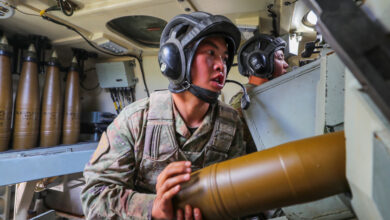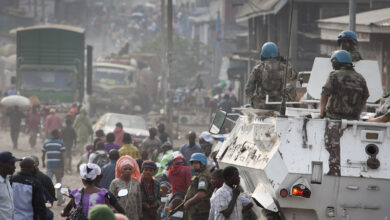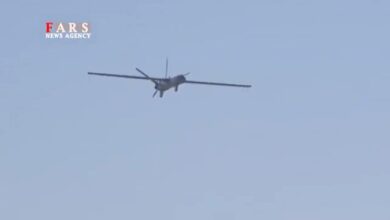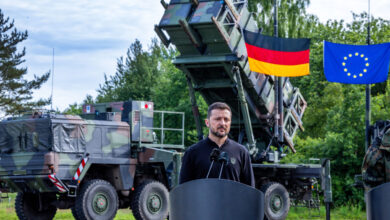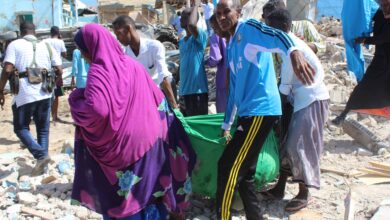Azerbaijan Closes Vital Road Link to Breakaway Karabakh
Azerbaijan on Tuesday temporarily shut the only road linking its breakaway Nagorno-Karabakh region with Armenia, accusing the Armenian branch of the Red Cross of smuggling.
The Armenian-populated region has been at the center of a decades-long territorial dispute between the Caucasus arch-foes, which have fought two wars over the mountainous territory.
The closure comes ahead of European Union-mediated talks in July between the ex-Soviet countries’ leaders, and as regional mediators, Washington, Brussels, and Moscow, are distracted by the NATO summit in Lithuania.
“The passage through Lachin checkpoint of the state border is temporarily suspended” pending an investigation into the Red Cross using its medical vehicles for “smuggling,” Azerbaijan’s state border service said on Tuesday.
It said the decision was made after the Red Cross failed to “take necessary steps to prevent illegal actions” such as smuggling mobile phones from Armenia to Karabakh, using the organization’s medical vehicles.
Armenia urged international action, calling the move part of Baku’s policy of “ethnic cleansing.”
“More international efforts and actions needed to lift” the Karabakh blockade and “to prevent ethnic cleansing,” foreign ministry spokeswoman Ani Badalyan said in an English-language Twitter post.
The Geneva-based International Committee of the Red Cross denied Baku’s claims, saying that “no unauthorised material has been found in any vehicle belonging to ICRC.”
“However, we regret that without our knowledge four hired drivers tried to transport some commercial goods in their own vehicles which were temporarily displaying the ICRC emblem,” it added in a statement.
Humanitarian Crisis
Azerbaijan in April set up the border point at the entrance to the Lachin corridor, exacerbating allegations from Armenia of a Karabakh “blockade.”
The Armenian branch of the Red Cross said in late June that Azerbaijan was blocking access to Karabakh, as concern grew over the humanitarian crisis in the restive region.
Azerbaijan’s state border service said several days later that traffic through the Lachin corridor — policed by Russian peacekeepers — was resumed.
The latest developments followed a months-long blockade by Azerbaijani environmental activists, which Yerevan claims spurred a humanitarian crisis and food and fuel shortages.
Azerbaijan insisted at the time that civilian transport could go unimpeded through the Lachin corridor.
‘Ethnic Cleansing’
Armenian Prime Minister Nikol Pashinyan said last month that the “humanitarian situation in Karabakh has worsened dramatically.”
“Food supplies to Karabakh have practically ceased and patients are not being allowed to be taken to hospitals in Armenia for medical treatment,” he said.
Baku’s “actions prove that Azerbaijan is pursuing a policy of ethnic cleansing in Karabakh,” he added.
In February, the International Court of Justice (ICJ) — the UN’s top judicial body — had ordered Azerbaijan to ensure free movement on the road.
Amnesty International said at the time that the blockade of the Lachin corridor “is endangering the lives of thousands of people” in Karabakh.
The two former Soviet republics have fought two wars for control of Karabakh, in the 1990s and again in 2020.
Six weeks of fighting in autumn 2020 ended with a Russian-sponsored ceasefire agreement that saw Armenia cede swathes of territories it had controlled for decades.
Under the deal, the five-kilometer-wide Lachin Corridor is to be manned by Russian peacekeepers to ensure free passage between Armenia and Karabakh.
There have been frequent clashes at the two countries’ shared border despite the ongoing peace talks between Baku and Yerevan under the mediation of the European Union and United States.
When the Soviet Union collapsed in 1991, ethnic Armenian separatists in Karabakh broke away from Azerbaijan. The ensuing conflict claimed some 30,000 lives.





